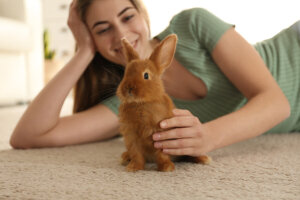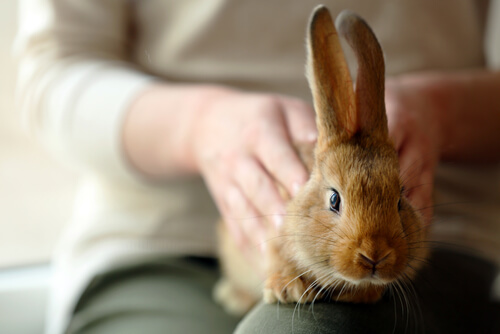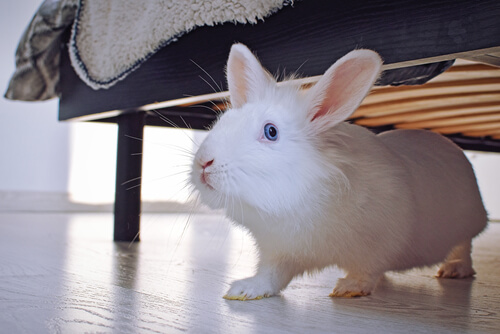Advantages and Disadvantages of Having a Rabbit


Written and verified by the biologist Cesar Paul Gonzalez Gonzalez
Rabbits are one of the most popular pets of all because of their cute and friendly appearance. It’s not usually a problem to look after them, and that’s why many families choose to keep them as companions. However, there are several advantages and disadvantages that should be considered before having a rabbit as a pet.
Although it’s true that these animals can be an excellent choice as companions, they shouldn’t be chosen without knowing their characteristics and needs. Remember that having a pet is a great responsibility and its quality of life will depend entirely on you. If you want to learn a little more about having a rabbit, as well as the advantages and disadvantages of keeping them in captivity, continue reading.
Rabbits as pets
Rabbits are independent animals that don’t usually need excessive attention from their owners. However, this doesn’t mean that they don’t enjoy living and spending time with them. In fact, they adapt very well to people’s living habits, so anyone could keep them as pets without much trouble.
Of course, they need basic care such as good food, a suitable habitat, hygiene and veterinary attention. So the simplicity of keeping them in captivity doesn’t justify neglecting these aspects. Like other animals, there are several advantages and disadvantages of having a rabbit by your side. Check them out below.

Advantages
A rabbit’s behavior, appearance, and basic needs give them certain advantages as a pet. Some of these advantages are the following:
- Cute appearance: Rabbits have a furry and cute appearance that’s very attractive to people.
- Docile attitude: In nature, this animal is prey, so its aggressive actions are minimal and only appear in certain scenarios when they face danger.
- Sociable behavior: Rabbits can be sociable enough to coexist with children, dogs and other animals without any problem. However, care must be taken to keep an eye on them in every interaction.
- Withstands loneliness: This animal is solitary by nature, so it isn’t a problem to be left alone or unattended for a while.
- Wide variety of breeds: As with dogs or cats, there is a wide variety of rabbit breeds to choose from. From dwarf rabbits that don’t grow more than 30 centimeters (12 inches) long, to those that almost reach one meter (3.3 feet) in length.
- High intelligence: Athough it may not seem like it, rabbits love to be trained and are good at learning certain tricks.
- Impeccable cleanliness: Rabbits tend to groom themselves for most of their day, which means they take great care of their hygiene and cleanliness. Thanks to this, it isn’t necessary to bathe them if the necessary care is maintained.
Disadvantages
In the same way that happens with other animals, several disadvantages appear when having a rabbit as a pet. Among the most important are the following:
- They are messy: Rabbits’ teeth don’t stop growing, so they tend to chew on different things and create a lot of mess in their habitat. Also, while feeding, they leave scraps of food all over the place.
- They need to get out of their habitat: Although their home is adequate and spacious enough, they also need to get out and explore. However, this can be a nuisance for the owners, as they may cause some damage by chewing on fabrics, wires, and other objects.
- A cage isn’t enough: It’s common to think that rabbits only need a small cage to live in. However, these habitats are inadequate for them, as they cause them stress and can even injure their limbs. It’s always best to have a large space where they can move around easily. The only problem is that this may not be possible and too expensive for their owners.
- They are very susceptible to stress: Stress in rabbits usually appears because their basic needs aren’t met. This problem can become serious and even life-threatening, as it modifies their behavior and generates dangerous self-injurious behavior.
- Few veterinarians: There aren’t many veterinarians specializing in rabbit health, as they still aren’t a very common pet. For this reason, it’ll probably be difficult to find a specialist to check and attend to them in an adequate manner.
- Some rabbits are very nervous and shy: Just like any other animal, rabbits can have different personalities. This isn’t always good, as there are some nervous and shy specimens that are more prone to inappropriate behavior. If they aren’t taken care of, they may become aggressive.

Is having a rabbit a good option?
In spite of the advantages and disadvantages we’ve explained to you, the fact is that the choice about having a rabbit as a pet depends on each owner. These mammals can become excellent companions in your daily life, but only if you offer them great quality of life and take care of them properly.
Keep in mind that you shouldn’t choose a pet only for its appearance or ease of care, but you should also consider the financial and time restrictions. If you don’t look after these points, then it could cause problems in the animal’s quality of life. Remember that they depend entirely on you, so don’t leave this important choice to chance.
Rabbits are one of the most popular pets of all because of their cute and friendly appearance. It’s not usually a problem to look after them, and that’s why many families choose to keep them as companions. However, there are several advantages and disadvantages that should be considered before having a rabbit as a pet.
Although it’s true that these animals can be an excellent choice as companions, they shouldn’t be chosen without knowing their characteristics and needs. Remember that having a pet is a great responsibility and its quality of life will depend entirely on you. If you want to learn a little more about having a rabbit, as well as the advantages and disadvantages of keeping them in captivity, continue reading.
Rabbits as pets
Rabbits are independent animals that don’t usually need excessive attention from their owners. However, this doesn’t mean that they don’t enjoy living and spending time with them. In fact, they adapt very well to people’s living habits, so anyone could keep them as pets without much trouble.
Of course, they need basic care such as good food, a suitable habitat, hygiene and veterinary attention. So the simplicity of keeping them in captivity doesn’t justify neglecting these aspects. Like other animals, there are several advantages and disadvantages of having a rabbit by your side. Check them out below.

Advantages
A rabbit’s behavior, appearance, and basic needs give them certain advantages as a pet. Some of these advantages are the following:
- Cute appearance: Rabbits have a furry and cute appearance that’s very attractive to people.
- Docile attitude: In nature, this animal is prey, so its aggressive actions are minimal and only appear in certain scenarios when they face danger.
- Sociable behavior: Rabbits can be sociable enough to coexist with children, dogs and other animals without any problem. However, care must be taken to keep an eye on them in every interaction.
- Withstands loneliness: This animal is solitary by nature, so it isn’t a problem to be left alone or unattended for a while.
- Wide variety of breeds: As with dogs or cats, there is a wide variety of rabbit breeds to choose from. From dwarf rabbits that don’t grow more than 30 centimeters (12 inches) long, to those that almost reach one meter (3.3 feet) in length.
- High intelligence: Athough it may not seem like it, rabbits love to be trained and are good at learning certain tricks.
- Impeccable cleanliness: Rabbits tend to groom themselves for most of their day, which means they take great care of their hygiene and cleanliness. Thanks to this, it isn’t necessary to bathe them if the necessary care is maintained.
Disadvantages
In the same way that happens with other animals, several disadvantages appear when having a rabbit as a pet. Among the most important are the following:
- They are messy: Rabbits’ teeth don’t stop growing, so they tend to chew on different things and create a lot of mess in their habitat. Also, while feeding, they leave scraps of food all over the place.
- They need to get out of their habitat: Although their home is adequate and spacious enough, they also need to get out and explore. However, this can be a nuisance for the owners, as they may cause some damage by chewing on fabrics, wires, and other objects.
- A cage isn’t enough: It’s common to think that rabbits only need a small cage to live in. However, these habitats are inadequate for them, as they cause them stress and can even injure their limbs. It’s always best to have a large space where they can move around easily. The only problem is that this may not be possible and too expensive for their owners.
- They are very susceptible to stress: Stress in rabbits usually appears because their basic needs aren’t met. This problem can become serious and even life-threatening, as it modifies their behavior and generates dangerous self-injurious behavior.
- Few veterinarians: There aren’t many veterinarians specializing in rabbit health, as they still aren’t a very common pet. For this reason, it’ll probably be difficult to find a specialist to check and attend to them in an adequate manner.
- Some rabbits are very nervous and shy: Just like any other animal, rabbits can have different personalities. This isn’t always good, as there are some nervous and shy specimens that are more prone to inappropriate behavior. If they aren’t taken care of, they may become aggressive.

Is having a rabbit a good option?
In spite of the advantages and disadvantages we’ve explained to you, the fact is that the choice about having a rabbit as a pet depends on each owner. These mammals can become excellent companions in your daily life, but only if you offer them great quality of life and take care of them properly.
Keep in mind that you shouldn’t choose a pet only for its appearance or ease of care, but you should also consider the financial and time restrictions. If you don’t look after these points, then it could cause problems in the animal’s quality of life. Remember that they depend entirely on you, so don’t leave this important choice to chance.
All cited sources were thoroughly reviewed by our team to ensure their quality, reliability, currency, and validity. The bibliography of this article was considered reliable and of academic or scientific accuracy.
- Bays, TB. (2006). Rabbit behavior. In: Bays TB, Lightfoot T, Mayer J (eds). Exotic Pet Behavior. St. Louis, MO: Saunders; Pp. 1-49.
- Harriman, M. (2005) House Rabbit Handbook: How to Live with an Urban Rabbit, 3rd ed. Alameda: Drollery Press.
- Nebraska Human Society. (2004). Rabbit care. Recuperado el 7 de junio de 2022, disponible en: http://support.nehumanesociety.org/site/DocServer/rabbitcare.pdf?docID=266
- Seattle Animal Shelter. (2018). A care guide for your rabbit. Recuperado el 7 de junio de 2022, disponible en: https://www.seattle.gov/documents/Departments/AnimalShelter/care-guides/care-sheet-rabbit.pdf
This text is provided for informational purposes only and does not replace consultation with a professional. If in doubt, consult your specialist.








